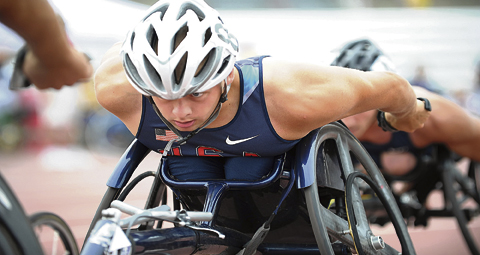September 28 | ![]() 0 COMMENTS
0 COMMENTS ![]() print
print

Do we only see what we want to see?
In Media Matters, Simon Dames asks whether or not we, as a society, have a blind spot when it comes to how we value human life?
London 2012 and the Sarah Catt eight-year imprisonment for an illegal late abortion have, strangely, taken me back in time to a picturesque Cornwall of some 20 years ago,
I have never forgotten the conversation I had with a local Catholic priest down there on that most pleasant of summers regarding that most unpleasant of topics: abortion.
I always remember hearing the best and most succinct argument I have ever heard against the aborting of children who have Down’s Syndrome. The priest, who had a brain of a lawyer due to the fact that in a previous vocation he was a lawyer, gave a reminder to the reality that not all pre-birth tests for Down’s children come up with the correct diagnosis. Sometimes the test does not pick up the Down’s, resulting in shock at the time of birth. And, at other times, the test mistakenly indicates Down’s, resulting in the aborting of the child.
The priest’s response to these mistakes was to bin the non-100 per cent pre-born proof test in favour of the 100 per cent post-birth proof test—by waiting until the child is born and then examining for Down’s syndrome. At this stage, if the child is found to have Down’s, he or she could then be terminated. Of course the priest did not actually mean this, but was proposing the situation to highlight the horrific hypocritical absurdity of both the abortion law and the abortion culture.
But how does that fit with the Paralympics 2012 and the Sarah Catt case? There was the sad news of 35-year-old Mrs Catt— who was sent to jail last week by Leeds Crown Court for aborting her unborn child on the week the child was meant to be born—had purchased abortion tablets over the internet and brought her pregnancy to an ‘early’ termination when she was 39 weeks pregnant, or ‘full term.’
Mr Justice Cooke, the sentencing judge, said that Mrs Catt ‘had robbed the baby of the life it was about to have and said the seriousness of the crime lay between manslaughter and murder.
But what is strange is that had the child been a Down’s child then Mrs Catt could have had that same child aborted right up until the point of birth. It would never have made the courts. It would never have made the newspapers. It would have been legal. Then there was the good news of the 2012 Paralympics. One could not help but be struck by the awe inspiring, and at times humbling, narratives of so many in the face of so much adversity. This was a fortnight display of the human spirit at its best.
Quite rightly, great coverage from the UK media and great support from the UK population was given to the Paralympians. Recognition was implicit that the participants were excelling in the face of greater than average challenges. Athletics’ David Weir, cycling’s Sarah Shorey and swimming’s David Roberts of the 2012 Paralympics have become just as well known as athletics’ Mo Farah, cycling’s Chris Hoy and swimming’s Michael Jamieson of the 2012 Olympics.
But how easily human beings live with blind spots, contradictions and even hypocrisies. How hard for the toppling of such inherent inconsistencies, which are, more often than not, built upon the foundations of comfort and apathy.
Until a fundamental earthquake-like change happens within individuals, the culture and the law, then the spotlight of simplicity and sincerity will continue to shine clearly and consistently on such obvious contradictions as a country which hails as heroes people, post-birth, with Down’s and disabilities, but dismisses people, pre-birth, as beyond legal consideration and protection.
And as with sporting events, we are all destined to be judged. All human beings live on the edge of history, all human beings like to think they live in the enlightened age. However, it is a bleak thought on how future generations will judge us and our lack of ethical, moral and humanitarian coherence.
For how often do we all look back at people in history and condemn their blind-spots to slavery, racism and war? How often do we shake our heads with that air of moral superiority, and guffaw with exaggerated disbelief at other’s ignorance and short-sightedness? As we have a tendency to look back on those of yesteryear and shake our heads with the moral superiority of dismay and disbelief, so too will our children and our children’s children.
And the question will most likely be repeated and repeated and repeated; how on the one hand could we focus our eyes on our Paralympians for two weeks every four years but, for those other 206 weeks, we turn a blind eye to the aborting of those perceived as disabled?
— Simon Dames is the press and research officer at the Scottish Catholic Media Office











